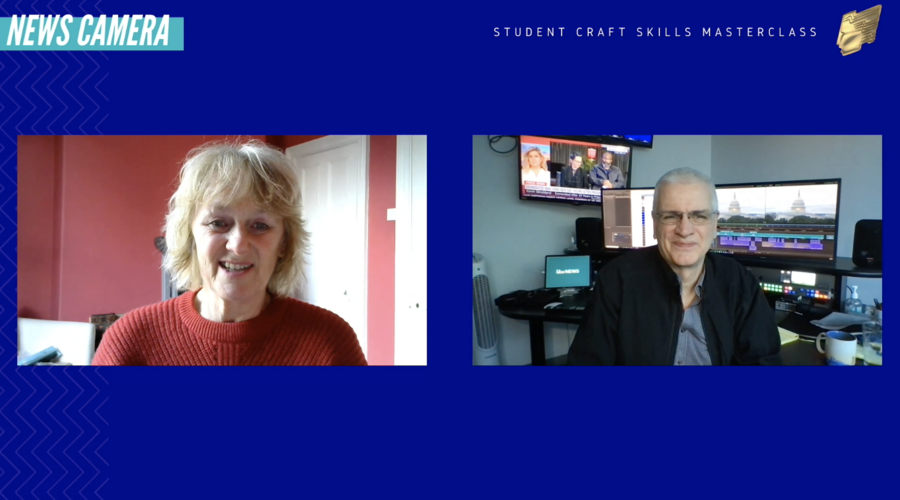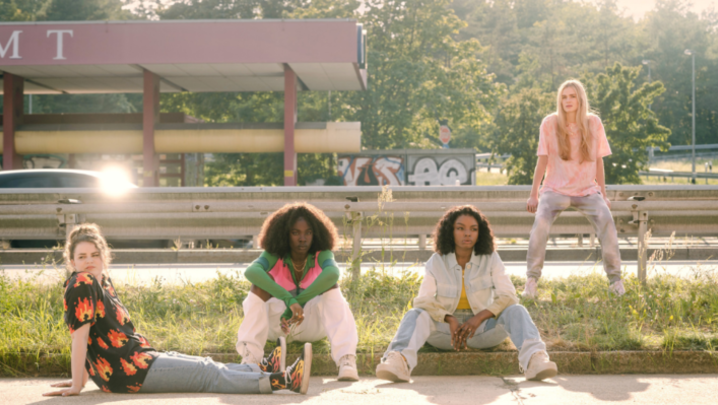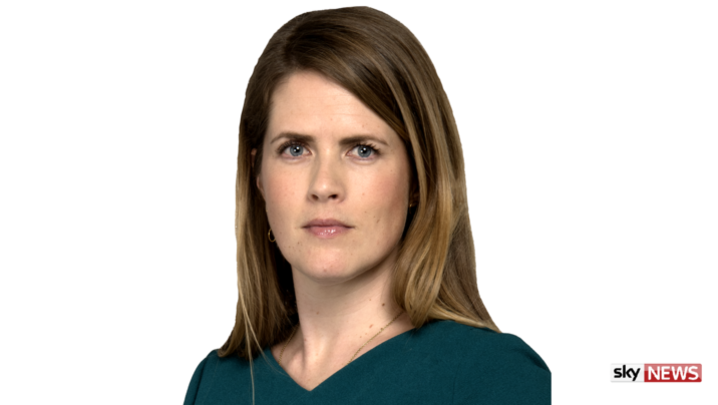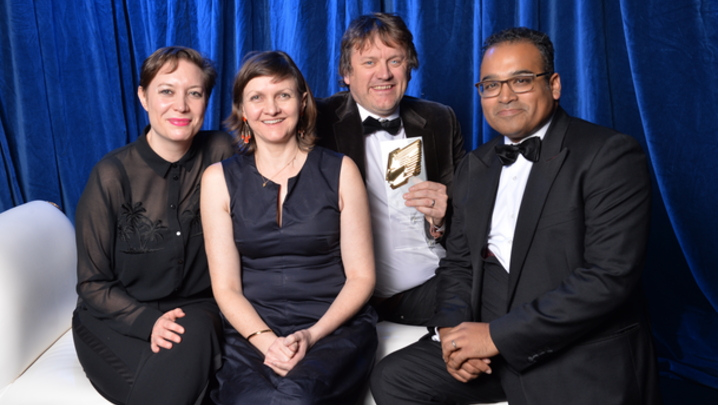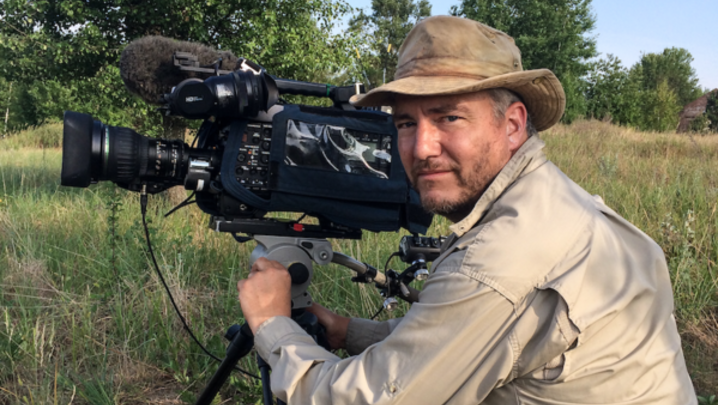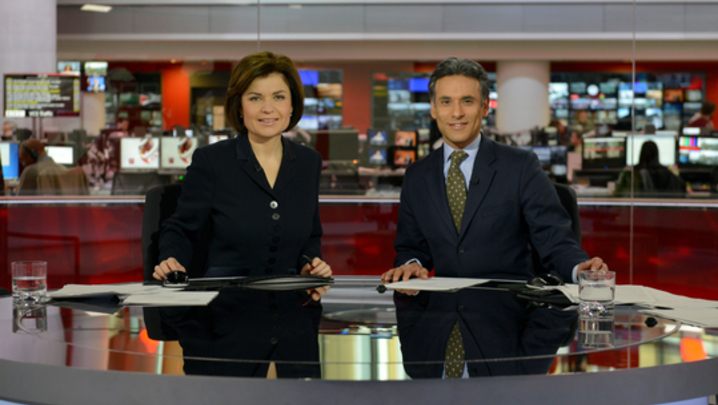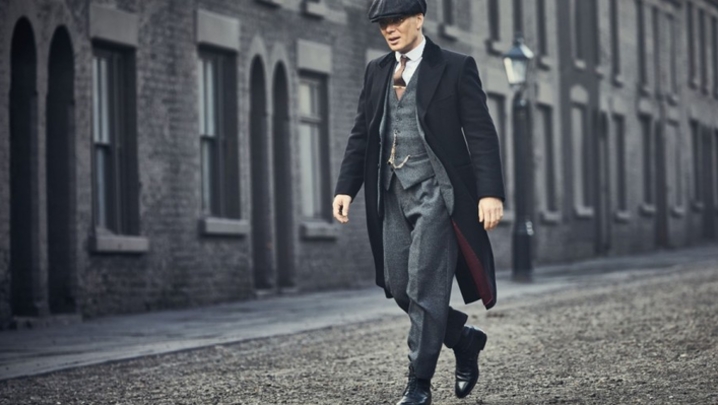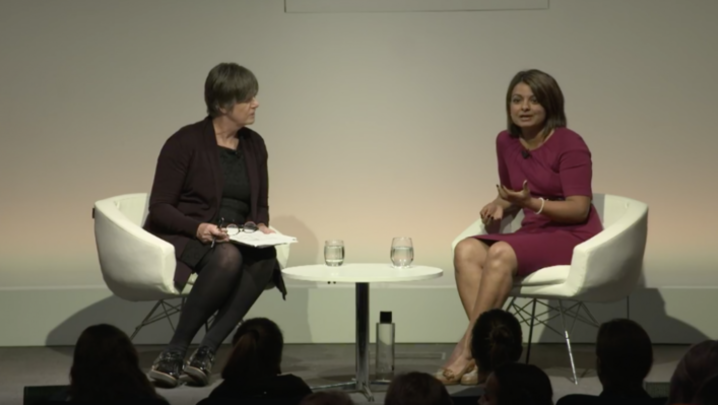Camera operator Mark Davey, ITV News, and cinematographer Diana Olifirova discuss their crafts at the RTS Student Craft Skills Masterclasses 2021 on Wednesday 24 November.
News Camera Masterclass with Mark Davey
ITN news camera operator Mark Davey told an RTS Student Crafts Skills Masterclass that sound journalistic skills, the ability to form good relationships and a keen logistical sense were all essential for his job.
It was Davey who worked alongside ITN reporter Robert Moore and producer Sophie Alexander as the only news crew to film inside the US Capitol when in January pro-Trump insurrectionists stormed Congress after claiming that the US Presidential election had been stolen from then.
“We’ve been speculating ever since as to why we weren’t beaten up and my camera wasn’t broken,” recalled Davey. “One of the things that helps is Robert’s great gift for putting a microphone under somebody’s nose and giving them (the rioters) an opportunity to speak.”
Another advantage that he and his ITN colleagues had in what was a highly charged situation was that they were an overseas news team. “I’m convinced that had Fox News been there that day they would have been lynched because the rioters felt betrayed by Fox,” he said. “CNN and MSNC would also have struggled. They were beaten up outside and their cameras were destroyed.
“Our foreignness helped. I’ve joked that because that day I was dressed like a Proud Boy no one attacked us.”
Belfast-born Davey, who began his career at UTV, gave the RTS a potted history of his career which has included filming in trouble spots like Northern Ireland and covering conflicts in Iraq, Afghanistan, Syria, Israel, and Lebanon.
ITN has a long, proud tradition of blurring the lines between camera operator and journalist which Davey is part of. “If my correspondent or producer gets a shot on their iPhone that is the opening shot of our piece, I have no problem with that,” he said. “In fact, I’m delighted. It’s a collective effort.”
He added: “Covering the Capitol riot, there was a long period that day when I was alone with Sophie, our producer. We were collectively making decisions. At no point was anyone in charge.”
The news camera Masterclass was chaired and produced by Helen Scott.
Cinematographer Masterclass with Diana Olifirova
The award-winning cinematographer, Diana Olifirova, told an RTS Craft Skills Masterclass that for her it was crucial to believe in the films that she worked on.
“For me it’s important to be selective and only do things that you love. You don’t do jobs solely for the money. In this profession it’s important to live and breathe the profession and love it because people can feel it in your work.
“It’s important to say no to things you don’t like. In the past I’ve taken work I didn’t like and as a result became angry. Now I only take on projects that I truly love.”
One of those projects was the recently recommissioned Channel 4 comedy, We Are Lady Parts, the story of an-all Muslim female punk band, which won three prizes at this year’s RTS Craft and Design Awards.
“It was challenging to work on because it was my first long-form project,” said Olifirova, who has worked on about 50 short films including commercials and music promos.
She is a graduate of the NFTS and a winner of the British Society of Cinematographer’s Emerging Cinematographer’s Award for her work on the short film, All of Me, directed by Daphne Schmon.
Olifirova was nominated for the RTS Craft and Design ‘Photography – Drama & Comedy’ Award, for We Are Lady Parts.
Nida Manzoor, the creator, writer and director of We Are Lady Parts had interviewed Olifirova for another project which she didn’t end up working on but remembered her. So instead she asked her to be the cinematographer on the Lady Parts pilot. When that was successful, she landed the series.
Good time-management was vital on a six-episode series like We Are Lady Parts. “You could spend all day lighting or rehearsing,” she said.
Cinematographers work closely with directors. “I always ask what they want first,” she explained. “I read the script, reflect on it and make notes. I also ask a lot of questions including about the script.
“If, for example, the script says that someone feels anxious I’ll think about how we can show it visually.”
Would she advise people to work for free when they are students? “No. I think it’s important to get paid when you are a trainee otherwise people will take advantage of you. For passion projects you can work for free, but always make sure they provide your travel expenses and your food.”
It was also important to overcome any shyness and build strong networks in the TV and film business: “I never felt comfortable introducing myself, I had to force it, but to get on you’ve got to do it.”
The Cinematography Masterclass was chaired by Ninder Billing, creative director at Darlow Smithson Productions, and produced by Helen Scott.

